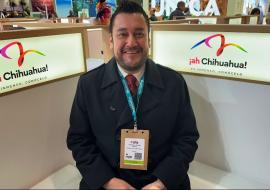Q & A with Jorge PesqueraPresident of the Aruba Hotel & Tourism Association (AHATA)


by Jose Carlos de Santiago
Aruba is determined to lunge even stronger into the European market. The fact that the island nation showed up in two of Europe´s major travel fairs earlier this year –FITUR and ITB- bears out how serious its efforts really are.
“And Aruba has plenty of opportunities in Europe and Latin America, but especially in Europe and for a number of reasons, above all, the cultural ties to Netherlands and other segments in the Old World,” says the President of AHATA in this exclusive interview with Caribbean News Digital.
Q.- Based on your longstanding professional career, can you tell us what differences you´ve found between the way Puerto Rican and Aruban hotels operate?
A.- I must say I come from a totally different standpoint because in Puerto Rico I used to work in the convention business and my approach was entirely focused on the MICE market. Now, I´m working for the Aruba Hotel & Tourism Association and I believe in Aruba we´re fortunate to have tremendous teamwork. There are two dozen hotels on the island and all of them belong to AHATA. That´s a pretty small scale compared to Puerto Rico that, on the other hand, makes our job a whole lot easier. I must also say that teamwork spirit is also seen in other sectors on the island, even with the local tourism authorities at the Aruba Tourism Association (ATA).
Q.- What policy do you think Aruban hoteliers should follow to avoid putting all the eggs in just basket, I mean, in the U.S. basket?
A.- Well, that´s precisely what we were doing at ITB. The United States of America has traditionally been the number-one outbound market for a considerable chunk of the Caribbean islands, only with a few rare exceptions. And Aruba has plenty of opportunities in Europe and Latin America, but especially in Europe and for a number of reasons, above all, the cultural ties to Netherlands and other segments in the Old World. I insist that our chances in Europe are pretty good and it thrills me to think all the things we can do in the European market. AHATA has recently appointed someone who will lead the group´s marketing and sales policy for Europe. That person is going to work hand in hand with ATA people in Holland just to make sure we can count on the necessary distribution channels and relationships in that particular part of the world.
Q.- To the best of my knowledge, Aruba doesn´t have a unified representative in Europe, but rather each and every hotelier has a representation of his own in Netherlands. What are the chances of reaching out to other countries in Europe?
A.- I think we need to be open-minded to all possibilities. As you know, I´m deeply interested in the Iberian Peninsula because I think Aruba offers a great alternative to the Caribbean, especially due to the fact that the Aruban population speaks fluent Spanish and the Spaniards remained on the island for a number of years during the colonial rule. So, it´s easy for Aruba to cater to both the Spanish and the Portuguese markets. What we need to do is forge stronger ties, come up with more creative promotional ideas, and obviously open up to more and more air connections. That´s always a tad of a challenging topic but I think we can work it out with a little bit of creativeness.
Q.- The island nation has 10,000 hotel rooms. Tourism Minister Briesen told me it´s 7,000. Why is there such a difference in the way you handle these figures?
A.- That depends on how timeshare units are counted. Many of them have two or three rooms, and that´s the reason why there´s such a difference. Nevertheless, this small island has huge capacities and great expansion possibilities. The Spaniards are coming on strong, I mean the Spanish hotel chains like RIU and Occidental. I hope this expansion could render in far more opportunities for us in this part of the world.
Q.- As to that growth in the number of European travelers, how long will it take to bring in large scores of them to Aruba?
A.- I think the kind of growth we want to build on can be achieved in the short run, especially now that the euro is still flexing its muscles and the European private sector is pouring far more money into the Caribbean. In the light of recent occurrences in the U.S., I think we need to be more cautious when looking at the American market and focus more on other parts of the world that could equally generate big-time profits for Aruba.
Q.- How much money does the average foreign tourist spend in Aruba?
A.- I don´t have that information right now.
Q.- What´s the average hotel fare for five-star, four-star and smaller lodgings?
A.- Our ADR (Average Daily Rate) in 2005 was hovering around $150 and $170 a room.
Q.- Is there any statistical information as to the nationality of those tourists who visit Aruba?
A.- There´s plenty of statistical information to determine where those foreign tourists come from. Last year, for instance, approximately 72 percent of all foreign sunbathers hailed from North America, and the remainder was shared by Latin Americans and Europeans.
Q.- Aren´t Aruban hoteliers asking the island nation´s government for more resiliency to hire qualified personnel for the industry? I believe that´s one of the major snags in your way.
A.- Absolutely. There´s no doubt that the topic of qualified personnel employment is a thorny one and a major concern to all of us. Aruba´s hotel industry has grown tremendously over the past ten of fifteen years, so we need more flexibility when it comes to hiring workforce from overseas and having these potential employees get their working permits as soon as possible.














